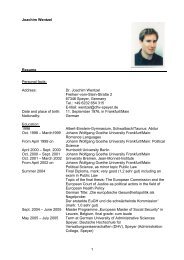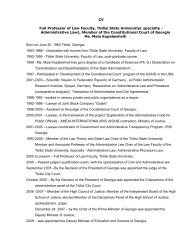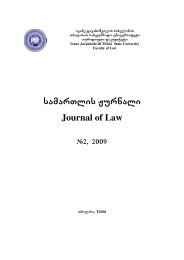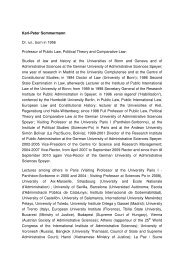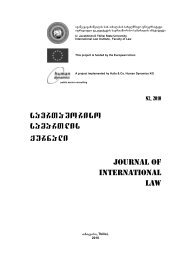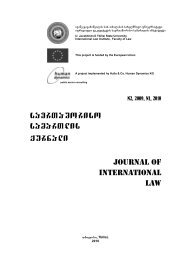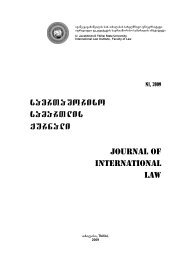Untitled
Untitled
Untitled
Create successful ePaper yourself
Turn your PDF publications into a flip-book with our unique Google optimized e-Paper software.
K. TOTLADZE, GAPS OF THE LAW OF GEORGIA “ON INTERNATIONAL TREATIES OF GEORGIA”<br />
Ministers. Consequently, all bodies of the Government<br />
including Ministries as well as the<br />
State Ministers shouid have the right to submit<br />
a proposal on the conclusion of international<br />
treaty.<br />
The proposal shall be submitted to the<br />
Ministry of Foreign Affairs of Georgia, the latter<br />
submits these proposals to the Ministry of<br />
Justice of Georgia for conclusion on the compatibility<br />
of a treaty with the legislation of Georgia<br />
and on possible legal effects, to the Ministry<br />
of Finance – for the conclusion on possible<br />
financial-economic outcomes of a treaty<br />
and also to the relevant central body of executive<br />
authority. 9 In practice, the abovementioned<br />
procedure is extended in time and is<br />
rather complicated, since the interpretation of<br />
the general provision of law is made in a different<br />
ways by the Ministries and the Administration<br />
of the President. In order to increase<br />
the role of the Ministries as the lobbies of a<br />
treaty within their competence and to simplify<br />
the abovementioned procedure, the proposals<br />
of different Ministries submitted to the Ministry<br />
of Foreign Affairs shall be comprehensive<br />
and include the following: a) text of the<br />
international treaty in Georgian language;<br />
b) explanatory memorandum; c) opinion of the<br />
Ministry of Foreign Affairs on possible foreign<br />
political outcomes of International treaty;<br />
d) opinions of the Ministry of Justice on the<br />
compatibility of a treaty with the legislation of<br />
Georgia and on possible legal effects and in<br />
case of necessity draft law on amendments<br />
and addenda into the normative acts of Georgia;<br />
e) opinion of the Ministry of Finance on<br />
possible financial-economic outcomes of a<br />
treaty; f) opinion of relevant competent authority/authorities;<br />
g) paper of agreement including<br />
well-grounded arguments on acceptance<br />
or non acceptance of these opinions; h) name<br />
of the Ministry/Ministries responsible for the<br />
implementation of a treaty (whole package).<br />
On the bases of final analysis of the Ministry<br />
of Foreign Affairs this package shall be presented<br />
to the Administration of the President,<br />
which will reinforce the role of the Ministry of<br />
Foreign Affairs as a central authority for making<br />
political decisions. It is important to be<br />
mentione that the proposal on conclusion of<br />
intergovernmental treaty shouldl be submitted<br />
to the Prime Minister of Georgia.<br />
6. ACCEPTANCE OF INTERNATIONAL<br />
TREATY, AS ONE OF THE FORMS OF<br />
CONSENT TO BE BOUND BY A TREATY<br />
Existing current legislation does not provide<br />
for acceptana asa form of expression of consent<br />
to be bound by treaty .<br />
Acceptance of international treaty is a resent<br />
form of the consent of the State to be<br />
bound by a treaty. However, innovation is rather<br />
terminological then conceptual, which is<br />
proved by a treaty practice of the States and<br />
the fact that the same procedure in one case<br />
is considered as acceptance of a treaty and<br />
in other cases as accession to a treaty. For<br />
example, the Constitution of UNESCO provides<br />
for that the States may accede to the Constitution<br />
through its acceptance, 10 which shall be<br />
done by delivering the official document on<br />
the acceptance of a treaty to the Secretary<br />
General of the UN.<br />
In some cases the acceptance of a treaty<br />
may be applied instead of the ratification. This<br />
is possible when international treaty by to its<br />
goal and objective is not the subject to ratification.<br />
Mostly the term "acceptance" is included<br />
into the text of a treaty, as an alternative<br />
form of consent of a State to be bound by a<br />
treaty.<br />
Acceptance as well as approval shall be<br />
formed documentary. In opposite to the ratification<br />
instrument, document of the acceptance<br />
and approval does not have clearly determined<br />
form. Generally it is a letter or verbal<br />
note, which on behalf of the Government<br />
is signed by the Minister of Foreign Affairs or<br />
its deputy, although even in this case it is possible<br />
to exchange these documents or submit<br />
them to the depository for the filing. 11<br />
In a view of proper implementation of Article<br />
14 of the (1969) Vienna Convention "on<br />
the Law of Treaty" in practice, and considering<br />
the fact that multilateral international treaties<br />
often provide for the acceptance as one<br />
of the forms of consent of the State to be<br />
bound by a treaty, it is essential to establish<br />
particular legal mechanism by Georgian domestic<br />
legislation and to define which State<br />
shall have authority to accept international<br />
treaty as a form of consent of the State to be<br />
bound by a treaty.<br />
201




